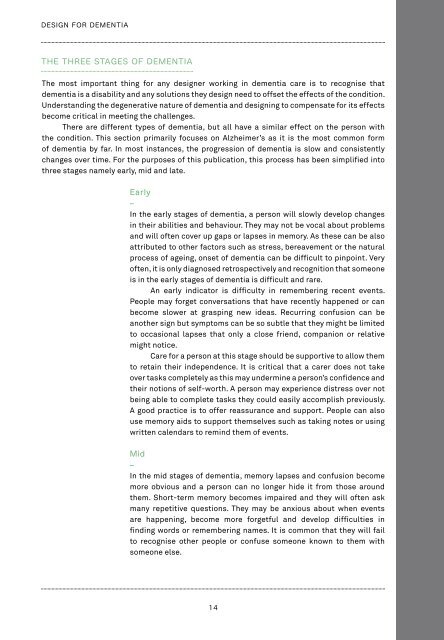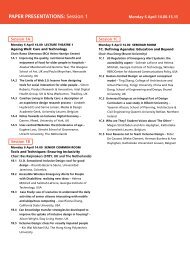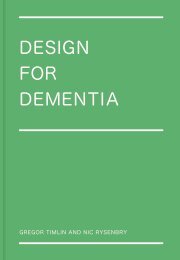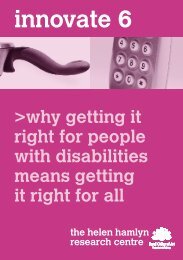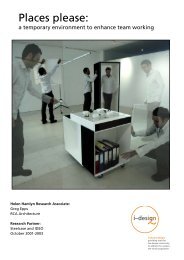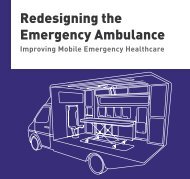Design for Dementia - Helen Hamlyn Centre - Royal College of Art
Design for Dementia - Helen Hamlyn Centre - Royal College of Art
Design for Dementia - Helen Hamlyn Centre - Royal College of Art
Create successful ePaper yourself
Turn your PDF publications into a flip-book with our unique Google optimized e-Paper software.
DESIGN FOR DEMENTIA<br />
CONTEXT<br />
The Three Stages Of <strong>Dementia</strong><br />
The most important thing <strong>for</strong> any designer working in dementia care is to recognise that<br />
dementia is a disability and any solutions they design need to <strong>of</strong>fset the effects <strong>of</strong> the condition.<br />
Understanding the degenerative nature <strong>of</strong> dementia and designing to compensate <strong>for</strong> its effects<br />
become critical in meeting the challenges.<br />
There are different types <strong>of</strong> dementia, but all have a similar effect on the person with<br />
the condition. This section primarily focuses on Alzheimer’s as it is the most common <strong>for</strong>m<br />
<strong>of</strong> dementia by far. In most instances, the progression <strong>of</strong> dementia is slow and consistently<br />
changes over time. For the purposes <strong>of</strong> this publication, this process has been simplified into<br />
three stages namely early, mid and late.<br />
Early<br />
–<br />
In the early stages <strong>of</strong> dementia, a person will slowly develop changes<br />
in their abilities and behaviour. They may not be vocal about problems<br />
and will <strong>of</strong>ten cover up gaps or lapses in memory. As these can be also<br />
attributed to other factors such as stress, bereavement or the natural<br />
process <strong>of</strong> ageing, onset <strong>of</strong> dementia can be difficult to pinpoint. Very<br />
<strong>of</strong>ten, it is only diagnosed retrospectively and recognition that someone<br />
is in the early stages <strong>of</strong> dementia is difficult and rare.<br />
An early indicator is difficulty in remembering recent events.<br />
People may <strong>for</strong>get conversations that have recently happened or can<br />
become slower at grasping new ideas. Recurring confusion can be<br />
another sign but symptoms can be so subtle that they might be limited<br />
to occasional lapses that only a close friend, companion or relative<br />
might notice.<br />
Care <strong>for</strong> a person at this stage should be supportive to allow them<br />
to retain their independence. It is critical that a carer does not take<br />
over tasks completely as this may undermine a person’s confidence and<br />
their notions <strong>of</strong> self-worth. A person may experience distress over not<br />
being able to complete tasks they could easily accomplish previously.<br />
A good practice is to <strong>of</strong>fer reassurance and support. People can also<br />
use memory aids to support themselves such as taking notes or using<br />
written calendars to remind them <strong>of</strong> events.<br />
Mid<br />
–<br />
In the mid stages <strong>of</strong> dementia, memory lapses and confusion become<br />
more obvious and a person can no longer hide it from those around<br />
them. Short-term memory becomes impaired and they will <strong>of</strong>ten ask<br />
many repetitive questions. They may be anxious about when events<br />
are happening, become more <strong>for</strong>getful and develop difficulties in<br />
finding words or remembering names. It is common that they will fail<br />
to recognise other people or confuse someone known to them with<br />
someone else.<br />
A substantial challenge will be the difficulty they experience<br />
in managing everyday life. They may need frequent reminders about<br />
activities or how to complete basic tasks. Gradually, the tasks <strong>of</strong> daily<br />
living will begin to become more difficult and they may need help or<br />
encouragement with eating, dressing or going to the toilet.<br />
A person may become more socially withdrawn or less com<strong>for</strong>table<br />
in group situations. In some cases they may also become more<br />
socially isolated as friends and family members no longer relate to<br />
the person in the same way as they once did and visit less <strong>of</strong>ten as<br />
a result.<br />
Other difficulties include awareness <strong>of</strong> their environment. They<br />
can <strong>of</strong>ten become confused about where they are and wander <strong>of</strong>f and<br />
become lost even if they are in familiar surroundings. In some situations<br />
this can present a risk to the person themselves and those around<br />
them, such as <strong>for</strong>getting to light the gas on a stove, trying to drive or<br />
leaving an iron on.<br />
The level <strong>of</strong> care a person needs at this stage increases. Those<br />
close to a person have to be vigilant, assessing tasks that the person<br />
may no longer be able to complete independently and assisting them<br />
where necessary. Activities such as shopping, cooking or anything<br />
else that requires a sequence to be completed will become more<br />
challenging. Those still living at home will require regular visits to<br />
ensure they are eating well, taking their medication and not at risk.<br />
Opportunities to connect socially with others will be important.<br />
Discussing the options <strong>of</strong> moving to a care home or increasing<br />
the level <strong>of</strong> daily assistance within their own home will become<br />
necessary during this stage.<br />
Late<br />
–<br />
In the late stages <strong>of</strong> dementia a person will ultimately become<br />
dependent on other people <strong>for</strong> nursing care. Memory loss extends to<br />
older memories and a person may not be able to determine the function<br />
<strong>of</strong> familiar objects or recognise people who are close to them. There is<br />
a gradual and increased loss <strong>of</strong> speech. People are <strong>of</strong>ten restless and<br />
they can have a tendency to want to search <strong>for</strong> someone or something.<br />
A common occurrence is the desire to be with their mother or in their<br />
own home, even if that is where they are being cared <strong>for</strong>.<br />
Some people can have less control <strong>of</strong> their emotions and<br />
become aggressive particularly if they feel threatened. It is common<br />
<strong>for</strong> a person to become increasingly immobile <strong>of</strong>ten starting to shuffle<br />
when they walk or becoming more unsteady on their feet. Many people<br />
can end up being bed bound or confined to a wheelchair. Some <strong>of</strong> the<br />
most challenging problems that can arise include the development <strong>of</strong><br />
a swallowing problem or incontinence.<br />
14<br />
15


